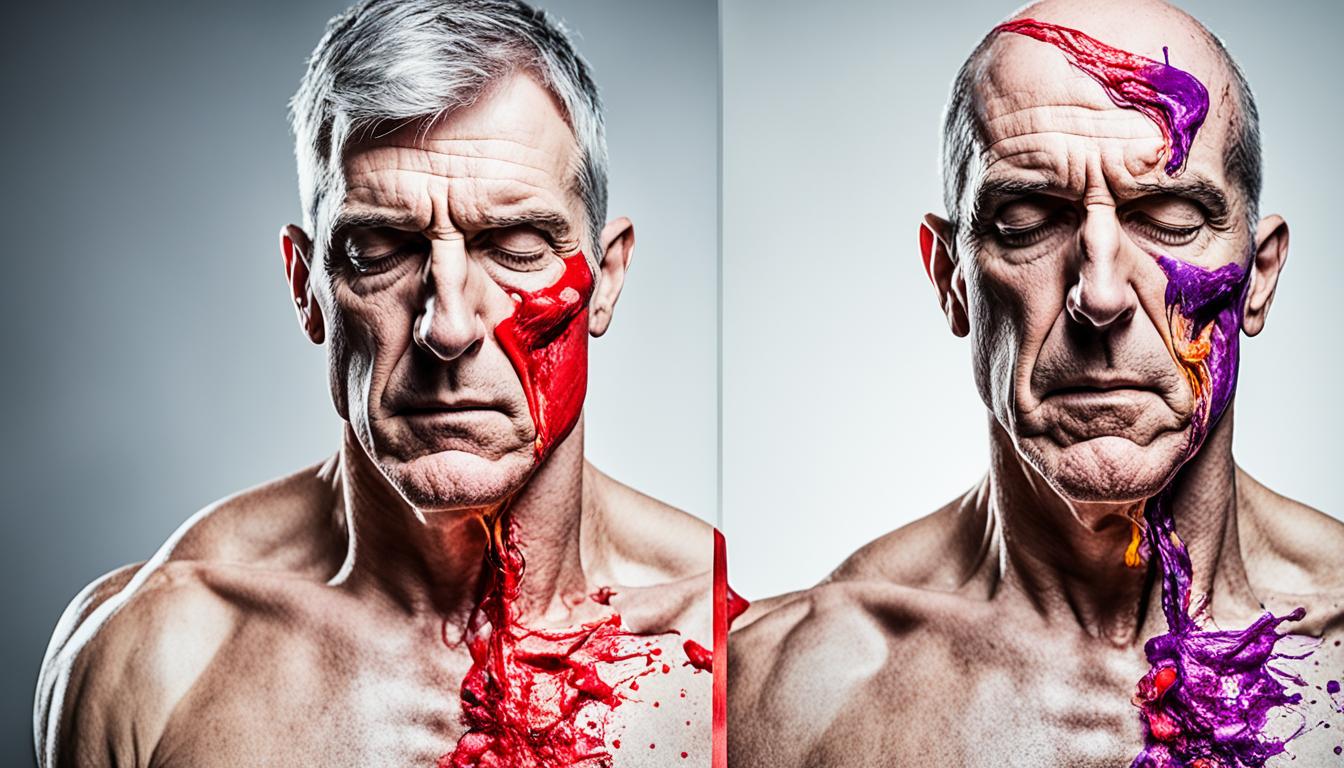Substance abuse disorder is a serious issue. It’s sometimes known as drug addiction or substance use disorder. It alters how our brains work and influences our actions. This issue appears when someone uses legal or illegal substances too much. This leads to them struggling to stop using those substances.
The effects can be hard to deal with. People might really want the substance all the time. They may find they need more of it to feel the same effect. And, when they try to stop, they might feel really sick. Different drugs can hook someone fast or slow. This condition can mess up lives, making health suffer and work harder.
Luckily, there are ways to help. Things like talking with an expert or staying at a place that helps you stop using exist. There are also new ways, like using stem cells to try and fix the problem.
Key Takeaways:
- Substance abuse disorder is a complex disease that affects the brain and behavior.
- It involves the misuse of legal or illegal substances, leading to an inability to control use.
- Common symptoms include intense cravings, the need for larger doses, and withdrawal symptoms.
- Substance abuse disorder can have severe consequences on physical, mental, and personal health.
- Treatment options include addiction counseling, rehabilitation centers, and innovative approaches like stem cell therapy.
Symptoms and Effects of Substance Abuse Disorder
Substance abuse disorder shows up in different ways. People with this disorder often feel a strong need to use substances regularly. This can lead to addiction. They might end up using more than they planned, showing they’ve lost control. They may ignore their duties and choices because of the substance.
This can hurt their lives at home and work. It’s common for them to do risky things when using the substance. This is a big problem that affects many.
Changes in how people look can also hint at substance abuse. Some may lose or gain weight because of their use. They might not do as well at school or work. This is because the substance messes up their focus and work drive.
Substance abuse disorder really messes with a person’s health and mind. It can cause heart and liver problems, and lung issues. They might get sick more easily. All these health problems mean folks with substance abuse disorder might not live as long or well as they could.
Using substances can also make mental health issues worse. Anxiety, depression, and even serious things like psychosis can happen. Treating these conditions is harder when someone is also battling addiction.
It’s vital to know the signs and effects of substance abuse disorder. This helps with finding ways to help those who want to recover. Treating both the addiction and its effects is key to helping people get better.
Co-Occurring Mental Disorders with Substance Abuse
Many people who struggle with drug or alcohol addiction also face mental health challenges. These could be anxiety, depression, ADHD, bipolar disorder, and others. It’s key to know that one disorder doesn’t always cause the other, but they often are found together.
Risk factors, genetics, and the world around us can lead to these issues. Some may start using substances to feel better, making the problems worse. Treating both addiction and mental health at the same time is very important, often done with special programs.
Common Comorbidities
When someone deals with addiction and a mental health issue together, it impacts their life greatly. Let’s look at some usual pairs of addiction and mental health issues:
| Co-Occurring Mental Health Disorder | Prevalence |
|---|---|
| Anxiety Disorders | Approximately 50% of individuals with substance abuse disorder |
| Depression | Approximately 30-40% of individuals with substance abuse disorder |
| ADHD (Attention-Deficit/Hyperactivity Disorder) | Approximately 20-30% of individuals with substance abuse disorder |
| Bipolar Disorder | Approximately 50-60% of individuals with substance abuse disorder |
| Personality Disorders | Approximately 35-60% of individuals with substance abuse disorder |
| Schizophrenia | Approximately 40-50% of individuals with substance abuse disorder |
Dual Diagnosis Treatment
Dual diagnosis treatment helps with both addiction and mental health. This approach knows these problems often work together. It uses therapy, medicine, and group support to help people heal fully. Such treatment offers a better shot at long-term recovery and a happier life.
Conclusion
Innovative treatments are key in fighting substance abuse. Stem cell therapy is a new, promising option for addiction recovery. It shines alongside traditional methods like counseling and rehab.
Offered in Thailand, stem cell therapy brings a fresh strategy. It aims to heal and renew the brain, dealing with addiction’s root causes. This method is showing hope by rebuilding brain connections and fixing neurotransmitter balance.
If addiction is a battle you’re facing, getting the right help is crucial. Exploring new treatments, like stem cell therapy, can offer hope. This makes Thailand a top pick for those wanting successful recovery treatments.
FAQ
Q: What is substance abuse disorder?
A: Substance abuse disorder is a complex disease. It affects the brain and behavior. This problem involves using legal or illegal substances uncontrollably.
Q: What are the symptoms and effects of substance abuse disorder?
A: Those with substance abuse disorder crave the substances intensely. They also need more over time. Symptoms include withdrawal when not using. The effects can damage the body, leading to heart issues. Mental health can suffer, causing anxiety and depression.
Q: Are there co-occurring mental disorders with substance abuse?
A: Yes, many with substance abuse also face mental health issues. These include anxiety, depression, ADHD, bipolar disorder, and schizophrenia. Addressing both substance abuse and mental health together is key for effective treatment.
Q: What is the innovative treatment option of stem cell therapy?
A: Stem cell therapy, found in Thailand, aims to tackle the root of substance abuse disorder. It helps the brain heal and regenerate. This therapy is showing promise in helping people recover from addiction.

